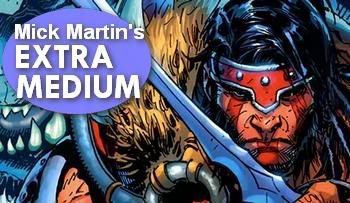
(Warning - This column contains SPOILERS for the series World of Warcraft)
I've lost more hours than I'd like to admit on the online game World of Warcraft. Eventually, I decided it was taking up far too much of my time. I haven't played it in months. However, while I was still trying to secure raid spots for Naxxramas and ancient Ulduar, I heard of the Walter Simonson scripted World of Warcraft series published by Wildstorm. I was curious, but never bothered to pick it up. Since I kicked off Extra Medium writing about a video game based on a comic, I figured it might be cool to look at the opposite - a comic based on a video game
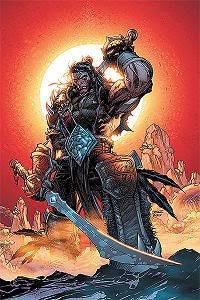 A friend who collects the series loaned me what he had. I managed to get through the first eleven issues before I simply couldn't take it anymore. Simonson's story is rushed and convoluted. The series is, not surprising, pretty action-heavy and that's unfortunate because Ludo Lullabi's action sequences tend to be a little confusing. Lullabi is replaced by Jon Buran in issue #8 and it's an improvement, but honestly not enough of one to keep me reading.
A friend who collects the series loaned me what he had. I managed to get through the first eleven issues before I simply couldn't take it anymore. Simonson's story is rushed and convoluted. The series is, not surprising, pretty action-heavy and that's unfortunate because Ludo Lullabi's action sequences tend to be a little confusing. Lullabi is replaced by Jon Buran in issue #8 and it's an improvement, but honestly not enough of one to keep me reading.More than whether or not the comic is good or bad (and it's pretty bad), I'm confused as to what the point of the whole thing is supposed to be. I'm not naive. I know the folks at Blizzard didn't gather around the conference table and say "Let's make some ART!" But I assume that, along with making money off existing players who also read comics, one major goal was to cast some fishing lines into the geek sea in the hopes of reeling more folks into paying $15/month for the privilege of experiencing the world of the comic book more directly. Whether we're talking about pandering to existing WoW players or finding new ones, the creative strategy of World of Warcraft seems weak.
First, readers unfamiliar with Azeroth would experience a fair share of information overload reading World of Warcraft. They're not eased into the world at all, and while the artists are able to capture the landscape quite accurately, there's no time for the uninitiated reader to really experience or appreciate the world. Simonson ping-pongs the heroes all over the game world without giving anyone a chance to breathe. By the beginning of issue #3 they're still enslaved gladiators, and by issue #4 theyr'e two countries (or game zones) away, leading an army of elves against the Horde.
Second, I don't think rushing the plot pace or hurrying the reader through the different settings of Azeroth would be appealing to existing WoW players either. Just the opposite, in fact. The very first panel of issue #1 illustrates exactly what I imagine would be refreshing to WoW players. A pair of orcs travels through Durotar. One says to the other that he hopes to reach Orgrimmar - the capital of the orcs' adoptive homeland - by nightfall. Any WoW player would have to chuckle a little bit reading that. The idea of it taking any more than maybe 10 minutes or so to travel from one end of Durotar to another sounds laughable. Even if your character in the game is too low level to own a mount, you'll hardly be hoping to get to Orgrimmar "by nightfall."
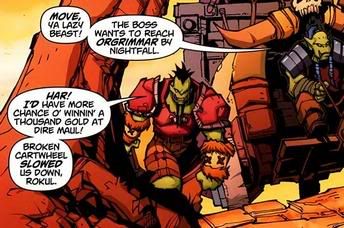
One of the more appealing aspects of the best fantasy fiction is the journey. It takes time and effort for the heroes to get from point A to point B. Complainers about Peter Jackson's Lord of the Rings films would do well to remember a literal adaptation would not only be around 900 hours long, but would be filled with almost nothing but the heroes walking, singing, eating, and then more goddamn walking. Even Jackson said one of his favorite parts of the books was the chapters in which Aragorn, Legolas, and Gimli run through Rohan in pursuit of the orcs who capture Merry and Pippin. Not when they wage war on the orcs attacking Helm's Deep, or give future filmmakers the chance to do really cool shit with animated elephants, but a couple of chapters out of The Two Towers where they do nothing but run for days and days and days.
The journey is something that is completely lost in World of Warcraft. Players can travel from one country to another, from one world to another, in less time than it would take you or I to drive to the next town. It has to be that way, of course, otherwise the game would be unplayable. But that's just it - while the game necessarily jettisons the epic journey, why does a comic have to do the same? In fact, it would seem to me that one of the truly great opportunities inherent in producing a WoW-based comic or prose novel would be to extend those oh-so-brief trips the players have in the game to something that would make Odysseus proud. Why not spend an entire storyline in a single country/game zone? Hell, why not spend an entire storyline in one town? One of the things that first drew me to World of Warcraft was its rich back-story. It boasts a lengthy, complex history and you can see that history realized in its virtual landscape.
But rather than take advantage of this, Simonson and co. speed you through Azeroth like impatient tour guides. The result is that reading World of Warcraft feels like playing the game, but with crappier animation, characters who gain levels a lot more quickly, and you don't get to actually do anything with them, you just watch them while they try to kill things and pretend they're not checking out the blood elf's chest.
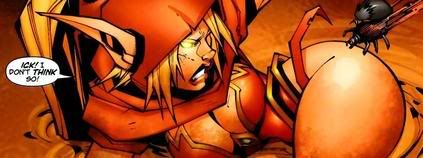
Third, there are volumes of information that go unexplained, but which seem necessary to any reader new to Azeroth. I wouldn't normally say Simonson would have to go in-depth with everything. For example, you don't need to know the minutiae involved in the enmity between night elves and blood elves to know why the night elf Broll and the blood elf Valeera are initially at each others' throats - the fact that they each have different words in front of "elf" is enough and anyone familiar with fantasy fiction knows race dictates character more there than in just about any other genre. But Simonson's blurring pace leaves little time to explain anything. The history of Azeroth can be pretty confusing. Just about everyone is at war with everyone else, there are alternate worlds and otherworldly portals, there are dozens of different raging deities trying to smash their way into the world to cause all sorts of badness, it all has something to do with the plot, but Simonson hardly explains any of it. To someone already playing WoW, no problem. I know who the Blackrock Orcs and the Dark Iron Dwarves are and I know why they're fighting, but while it's difficult for me to turn back time and see from the point of view of someone fresh to Azeroth, I find it tough to believe they'd be able to make heads or tails of this series.
Fourth, when it comes to drawing in WoW players, there's a question as to why the series doesn't have a subtitle. The fact that it's called simply World of Warcraft seems to set it up as the main story based on the game, which forgets something important about WoW. In the game, there are 10 playable races (soon there will be 12) and each race is in one of two warring factions. Humans, gnomes, dwarves, night elves and draenei (blue-skinned, hooved aliens with face tendrils - I call them "squid-chinnies") make up The Alliance. Orcs, trolls, tauren (basically minotaurs with a mythical Native American flavor), undead, and blood elves make up The Horde. While it certainly isn't true of everyone, many WoW players are fiercely loyal to one side or another, not unlike hardcore sports fans. Take a few trips to Blizzard's official forums and you will find - amidst plenty of other craziness - players of each faction arguing with each other like disgruntled siblings over whether the game developers more heavily favor one faction over another. My brother plays with a group of local friends. They get together every Friday night and play WoW. Back when I was still playing WoW, I went with my brother one night and brought my laptop. Upon spotting me running through Azeroth on my dwarf hunter, the house's owner placed a firm hand on my shoulder and said, "Uh, Mick? This is a Horde house." To be fair, he said it half-joking. But, to reiterate, he said it half-joking.
The story of World of Warcraft, however, pretty much focuses on the Alliance. It opens with an amnesiac human being pressed into a gladiator team with a night elf and blood elf. Later, the team wins at the Dire Maul arena where the human earns the name Lo'Gosh, escapes while visiting the tauren capital of Thunderbluff, and through a series of confusing and mostly unnecessary adventures, Lo'Gosh learns he is Varian Wrynn, the lost king of Stormwind - the last powerful human kingdom.
It leaves me wondering whether or not Horde players would ever have any interest in the book. Horde characters are treated sympathetically. In fact, it's a tauren who gives Lo'Gosh the means to escape his captors, but the Horde races can't help but come off like villains in certain parts because we're seeing everything from an Alliance perspective.
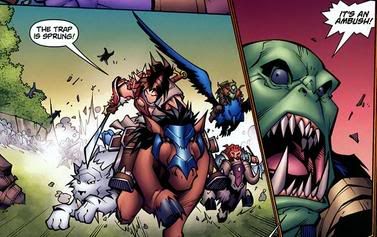
While neither Blizzard nor Wildstorm asked my opinion, I can't help but think the absolute best format for a World of Warcraft comic would be an anthology, not unlike Marvel Comics Presents. Or, at the very least, maybe a comic with one main story and one or two extra stories. Give the writers and artists some room to breathe. Let them explore Azeroth for exploration's sake and recapture the sense of journey. Like I said, I'm not naive. I know at the end of the day Blizzard just cares about how much dough they can rake in. Something I think many WoW players would agree with, and probably something others would find hard to swallow, is that the storytellers of the game have created a mythology that, in the right creative hands, could give birth to fantasy comics as impressive as Conan or ElfQuest, and I would be willing to bet could bring in more money. No bullshit, I could easily see a creative team using the mythology of WoW to make a comic that people with no interest at all in the game would want to pick up every month regardless. But rather than trying, and failing horribly, to recreate the game experience in the comic, they need to focus on what they can't already give players in the game.

No comments:
Post a Comment